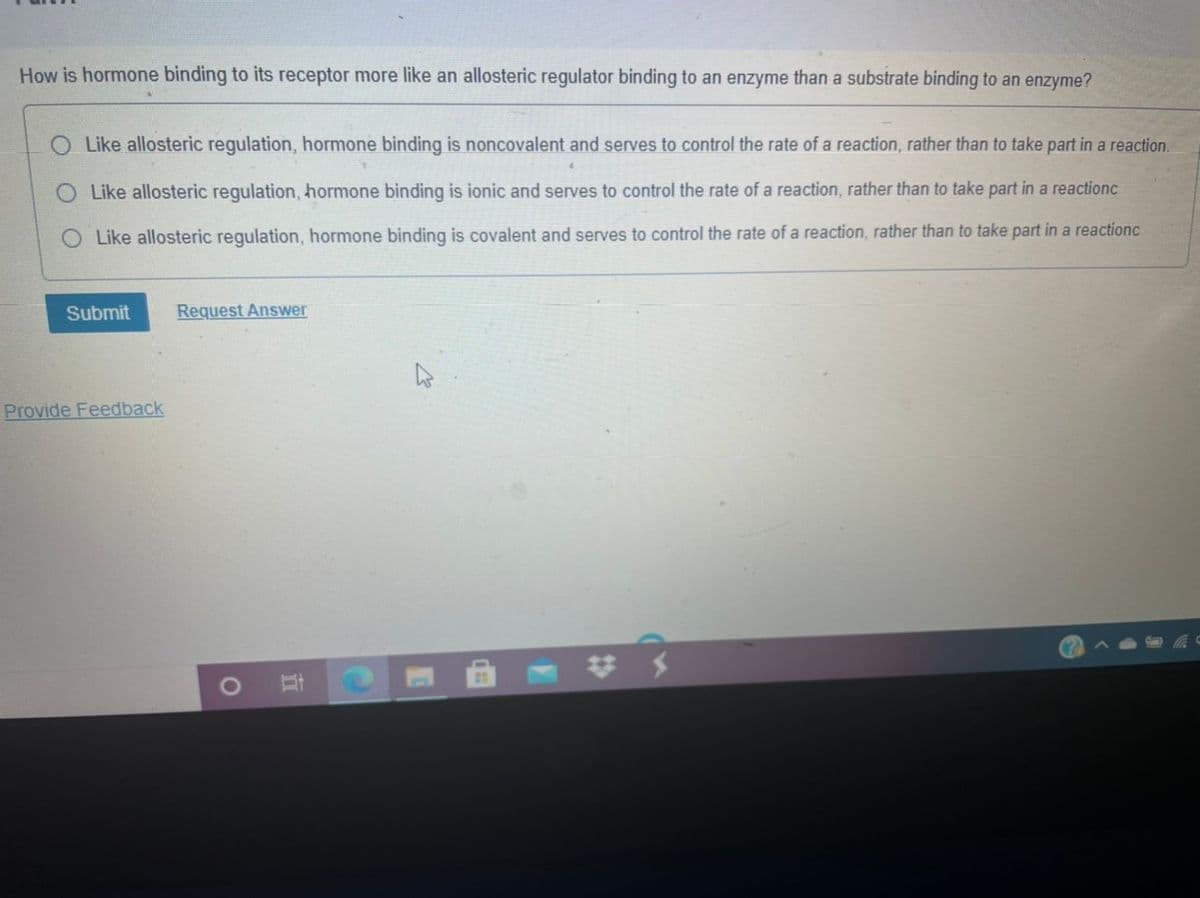How is hormone binding to its receptor more like an allosteric regulator binding to an enzyme than a substrate binding to an enzyme? Like allosteric regulation, hornmone binding is noncovalent and serves to control the rate of a reaction, rather than to take part in a reaction. O Like allosteric regulation, hormone binding is ionic and serves to control the rate of a reaction, rather than to take part in a reactionc O Like allosteric regulation, hormone binding is covalent and serves to control the rate of a reaction, rather than to take part in a reactionc Submit Request Answer
How is hormone binding to its receptor more like an allosteric regulator binding to an enzyme than a substrate binding to an enzyme? Like allosteric regulation, hornmone binding is noncovalent and serves to control the rate of a reaction, rather than to take part in a reaction. O Like allosteric regulation, hormone binding is ionic and serves to control the rate of a reaction, rather than to take part in a reactionc O Like allosteric regulation, hormone binding is covalent and serves to control the rate of a reaction, rather than to take part in a reactionc Submit Request Answer
Human Biology (MindTap Course List)
11th Edition
ISBN:9781305112100
Author:Cecie Starr, Beverly McMillan
Publisher:Cecie Starr, Beverly McMillan
Chapter15: The Endocrine System
Section: Chapter Questions
Problem 2RQ: A hormone molecule binds to a receptor on a cell membrane. It doesnt enter the cell; rather, the...
Related questions
Question

Transcribed Image Text:How is hormone binding to its receptor more like an allosteric regulator binding to an enzyme than a substrate binding to an enzyme?
Like allosteric regulation, hormone binding is noncovalent and serves to control the rate of a reaction, rather than to take part in a reaction.
Like allosteric regulation, hormone binding is ionic and serves to control the rate of a reaction, rather than to take part in a reactionc
O Like allosteric regulation, hormone binding is covalent and serves to control the rate of a reaction, rather than to take part in a reactionc
Submit
Request Answer
Provide Feedback
Expert Solution
This question has been solved!
Explore an expertly crafted, step-by-step solution for a thorough understanding of key concepts.
This is a popular solution!
Trending now
This is a popular solution!
Step by step
Solved in 3 steps

Recommended textbooks for you

Human Biology (MindTap Course List)
Biology
ISBN:
9781305112100
Author:
Cecie Starr, Beverly McMillan
Publisher:
Cengage Learning

Human Physiology: From Cells to Systems (MindTap …
Biology
ISBN:
9781285866932
Author:
Lauralee Sherwood
Publisher:
Cengage Learning

Human Biology (MindTap Course List)
Biology
ISBN:
9781305112100
Author:
Cecie Starr, Beverly McMillan
Publisher:
Cengage Learning

Human Physiology: From Cells to Systems (MindTap …
Biology
ISBN:
9781285866932
Author:
Lauralee Sherwood
Publisher:
Cengage Learning